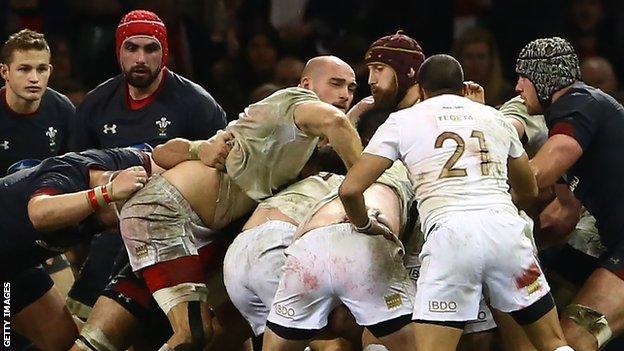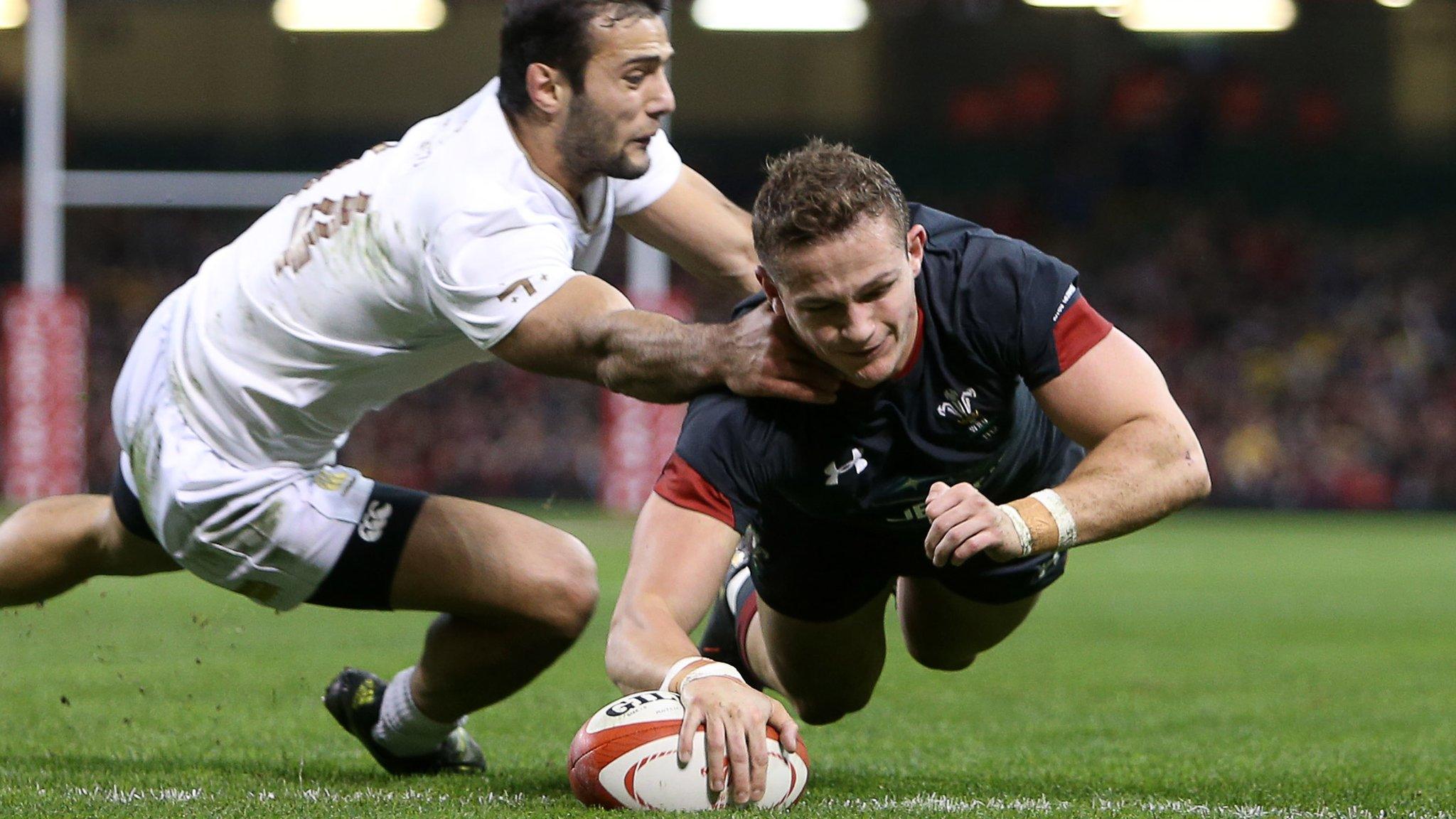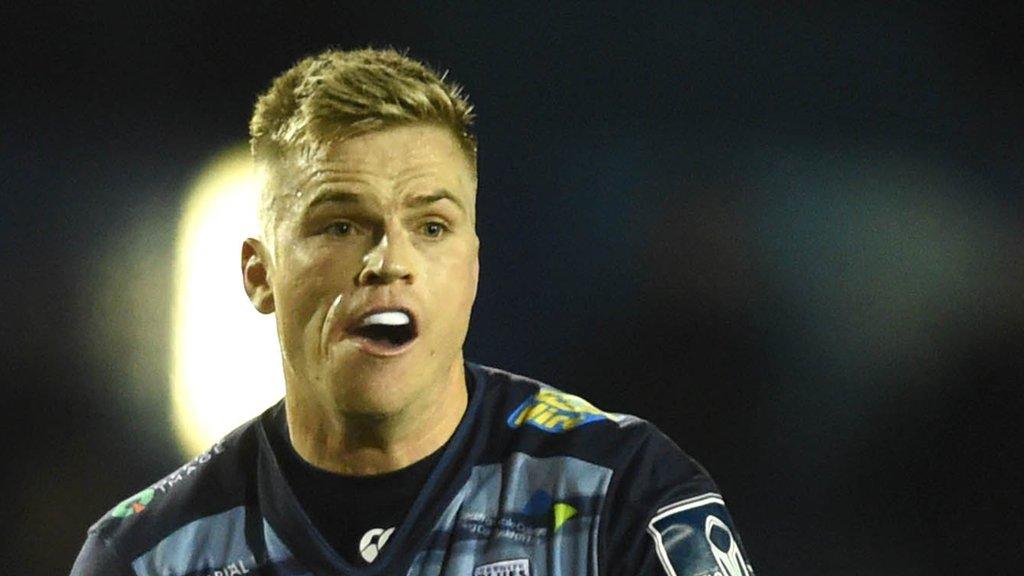Autumn international: Absent prop cramps Wales style in edgy Georgia win
- Published

The Georgia pack were as muscular and robust as all the pre-match predictions had suggested
Deja vu - a French phrase to describe "the strange feeling that in some way you have already experienced what is happening now".
Anyone in Cardiff to see Wales scrape past Georgia 13-6 who was also in Paris last March will know exactly what it means.
Then, Wales claimed France had bent the laws to bring on a replacement prop for a series of scrums during 20 minutes of added time.
The French - who won 20-18 - were later reprimanded by World Rugby, although no further action was taken as world rugby's governing body decided "there was no clear evidence that there was any intent to obtain a competitive advantage".
In Cardiff, Wales were unable to bring on a fit tight-head prop after Tomas Francis' 80th-minute yellow card had reduced them to 14 men.
With Georgia, trailing by seven points, apparently indicating they wanted to take a scrum, it meant French referee Mathieu Raynard could not allow the set-piece to be contested.

Tomas Francis sees yellow, and then the fun begins in Cardiff
So the visitors changed their mind, went for a line-out and Wales held out for victory.
The decision to allow uncontested scrums unquestionably robbed Georgia of a golden chance to claim a draw against Tier One opposition.
Afterwards Wales coach Warren Gatland said tight-head Leon Brown had developed cramp after being substituted for tactical reasons earlier in the game.
The other prop - Nicky Smith - was also injured, but could not have replaced Francis in any case because he is not a specialist tight-head.
"I can promise you there was nothing from our point of view to manipulate the laws. If Leon had been fit he would have gone back on," said Gatland.
If Georgia suspected foul play then coach Milton Haig was not making accusations, other than to raise his eyebrows and offer a rueful smile as he said: "Two players developed cramp at the same time?"
It seems Haig stepped back from his immediate post-match view that he would like the incident looked into.
Either way, the timing of Brown's cramped calves was convenient for Wales and unfortunate for Georgia.
For their part, World Rugby clarified that there has to be a medical reason for a player not to come back on the field in those circumstances.
It also added it would review the match as a matter of course - as it does for all internationals.
That this is even a discussion point partly answers two of the big questions set before the match, namely Georgia's scrum strength and Wales' strength in depth.
Are Georgia Six Nations material?
If rugby was a game just of forwards, scrums and driving mauls then Georgia most assuredly are good enough to face Europe's six best sides.
After struggling with the pace of the game in the early stages, the visitors fed off Welsh mistakes to do what they do best.
That consisted of winning scrum penalties, then setting up driving attacks from the resulting line-outs.
There was little apart from that to bother the Wales defence, which admittedly had its hands full dealing with the biff and bash of the pack.
London Irish flanker Lasha Lomidze's work in the loose backed up the front five's tight dominance.

Georgia were close but ultimately frustrated in Cardiff
Had that late scrum been contested, they might have left Cardiff with more than just praise and pride.
Irrespective of Six Nations chief executive John Feehan's position that there will be no relegation from the tournament in the foreseeable future, coach Haig is pleading for Georgia to at least get a chance to improve themselves.
"I think our performance was better than it was against Scotland last year [a 43-16 defeat]," he said.
"The key is getting used to the pace of the game and it took about 20 minutes.
"It goes back to our boys not being exposed to it at a high level often enough. We need more of these chances.
"Thirteen-six against a Tier One team is something to be proud of. We need more exposure and if we get them we'll get better."

Wales celebrate at the final whistle in Cardiff
How did Wales' untested players do?
Wales have had two narratives running this autumn - playing a more expansive, positive game and planning for the 2019 World Cup, where they will face Georgia again.
Gatland's 14 changes meant this team lacked the experience Wales have relied on in recent seasons.
And, in some respects, the two agendas got in each other's way. They were positive in turning down kickable penalty chances, which in turn meant Wales never had the scoreboard buffer to let the new boys play without the pressure to keep collecting points.
Had they taken a simple kick before half-time and another more difficult one when the score was 13-6, things might have been more comfortable.
The starting front row of Smith, Kristian Dacey and Brown had a second half to forget, not helped by the handling errors that allowed Georgia to play the game they love.
Wales forced it against Georgia - Lydiate
Afterwards Gatland felt they probably played too wide a game, failing to tie in the visitors' defence.
They also fell foul of television match official Leo Colgan when Hallam Amos' breathtaking touchdown was ruled out because the ball went forward in the build-up.
With the conversion it would have been 17-0. Instead, from the scrum Georgia were awarded a penalty and scored to make it 10-3. It was a turning point of sorts and Wales did not really recover their composure.
Captain Dan Lydiate made 26 tackles and scrum-half Rhys Webb sniped with purpose around the fringes.
They might make the cut for the match against the All Blacks, but it's hard not to see Gatland ringing the changes again.
The answers
This match suggests Wales have some way to go before they can look ahead to the World Cup with any confidence, while Georgia deserve - at the very least - more games against tier-one opposition.
There were more than 55,000 inside the Principality Stadium for the match, which suggests rugby fans will turn up to see the Georgians play and the game as a whole needs more teams to be able to compete at the top level.
Next week it's New Zealand in Cardiff and Wales have not beaten them in their last 29 attempts.
What's that definition of deja vu again?
- Published18 November 2017

- Published17 November 2017

- Published18 November 2017
